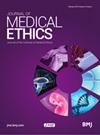智能护齿和接触性运动:数据伦理困境
IF 3.3
2区 哲学
Q1 ETHICS
引用次数: 0
摘要
在橄榄球等接触性运动中使用智能护齿,旨在通过提供头部撞击的实时数据来提高运动员的安全。这些配备传感器的设备可以测量碰撞力和频率,从而有可能识别出在比赛中可能被忽视的脑震荡。我们的想法是,这种强化监测将使球队、医生和其他利益相关者能够通过即时检测头部创伤和长期提供球员数据,更好地保护球员免受球场伤害的影响。尽管我们对更好地了解接触性运动运动员可能遭受的伤害表示欢迎,但引入新的途径收集球员表现和健康信息也带来了一些传统护齿所没有的道德问题。在本文中,我们考虑了四个值得注意的方面:设备和数据的有效性、运动员的选择、此类数据存在的固有问题以及使用和暴露此类数据的有害后果。我们认为,如果不能识别和解决在精英体育领域使用智能口罩的相关风险,不仅有可能造成对球员数据的虐待和误用,还可能危及一种新型健康监测方法的可接受性,而这种方法具有预防长期衰弱性疾病的潜力。本作品无数据。本文章由计算机程序翻译,如有差异,请以英文原文为准。
Smart mouthguards and contact sport: the data ethics dilemma
The use of smart mouthguards in contact sports like rugby aims to enhance player safety by providing real-time data on head impacts. These devices, equipped with sensors, measure collision force and frequency, potentially identifying concussions that might go unnoticed during gameplay. The idea is that such enhanced monitoring will enable teams, physicians and other stakeholders to better protect players from the effects of on-pitch injury through immediate detection of head trauma and the long-term provision of player data. While we welcome the move towards a better understanding of the potential harm that contact sports athletes may experience, introducing a new avenue through which information about player performance and health can be collected brings several areas of ethical concern absent from traditional mouthguards. In this paper, we consider four noteworthy areas: device and data efficacy, player choice, the inherent issues of such data’s existence and the harmful consequences of this data’s usage and exposure. We argue that failing to identify and address the risks associated with smart mouthguards’ employment in the elite sporting sphere not only risks the mistreatment and misapplication of player data but may also jeopardise the acceptability of a novel health monitoring method that has the potential to prevent long-term debilitating diseases. There are no data in this work.
求助全文
通过发布文献求助,成功后即可免费获取论文全文。
去求助
来源期刊

Journal of Medical Ethics
医学-医学:伦理
CiteScore
7.80
自引率
9.80%
发文量
164
审稿时长
4-8 weeks
期刊介绍:
Journal of Medical Ethics is a leading international journal that reflects the whole field of medical ethics. The journal seeks to promote ethical reflection and conduct in scientific research and medical practice. It features articles on various ethical aspects of health care relevant to health care professionals, members of clinical ethics committees, medical ethics professionals, researchers and bioscientists, policy makers and patients.
Subscribers to the Journal of Medical Ethics also receive Medical Humanities journal at no extra cost.
JME is the official journal of the Institute of Medical Ethics.
 求助内容:
求助内容: 应助结果提醒方式:
应助结果提醒方式:


